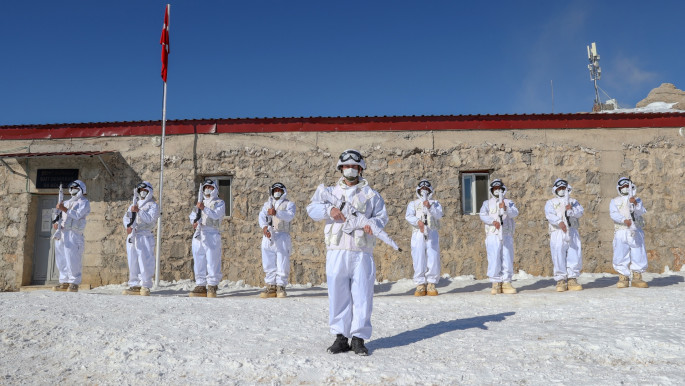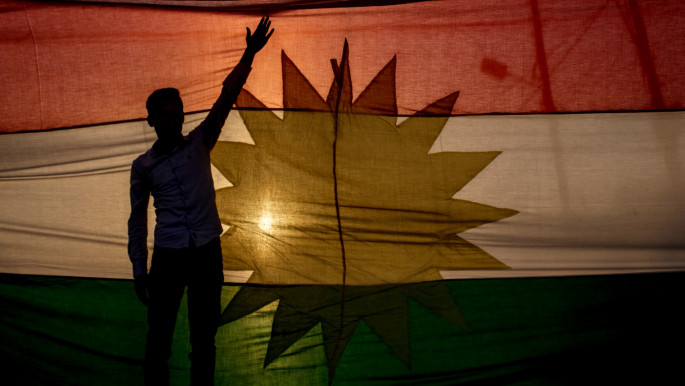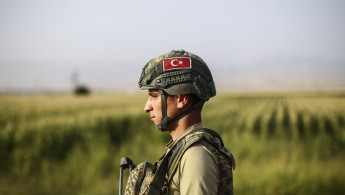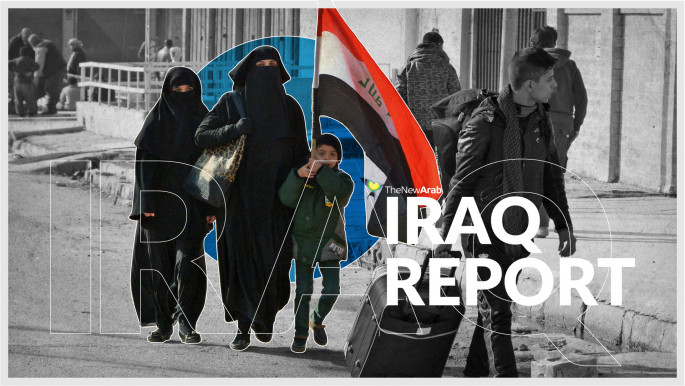The Iraq Report: Turkey and Iran trade diplomatic blows as tensions mount
Both sides have criticised each other for their respective actions in Iraq, with Iran accusing Turkey of breaching Iraqi sovereignty.
Meanwhile, US President Joe Biden has given his first indications of how he intends to deal with Iran-backed Iraqi militants who attack American interests by ordering new airstrikes. However, rather than striking at Iranian proxies in Iraq – the country where they conducted their operations against the US – the White House decided to bomb Syria instead, a demonstration that Biden will take limited action against Tehran.
Turkey and Iran trade diplomatic blows over Iraq
Iraq has once more emerged as an arena of competition between Turkey and Iran as the two historic rivals slam each other for breaches of Iraqi sovereignty amidst a Turkish push against Kurdish separatists hiding out in Iraq's Kurdistan region.
The diplomatic spat between the two regional powers comes following a botched hostage rescue operation launched by the Turkish military against the Kurdistan Workers' Party, or PKK, in February that resulted in the deaths of all 13 hostages in the mountainous Gara region near Dohuk.
According to a Turkish coroner's report, the captives were all killed by gunshot wounds fired at point blank range, indicating that they were unlawfully executed.
 |
Both sides have criticised each other for their respective actions in Iraq, with Iran accusing Turkey of breaching Iraqi sovereignty |  |
The Turkish state broadcaster, TRT World, subsequently aired "confessions" of captured PKK fighters admitting senior militants ordered their execution. However, it was not possible to verify whether the confessions were extracted under duress or not, and the suspects are now awaiting trial.
Only a day before the failed rescue attempt, Iraqi Shia militants belonging to the Harakat Hezbollah al-Nujaba group – notorious as being one of Iran's top proxies in Iraq – issued a warning threatening to attack the "Turkish occupation forces" if they pressed on with their anti-PKK operations.
Barely more than a week had passed when Iranian ambassador to Iraq, Iraj Masjedi, gave an interview to the Iraqi Kurdish outlet Rudaw, criticising Turkey's operations in the country and calling on Ankara to withdraw its forces and to refrain from "violating Iraqi soil".
 |
|
| Read more: In Iraqi Kurdistan, civilians count the cost of Turkey's fight against the PKK |
Masjedi's words triggered outrage in Ankara which wasted no time in summoning Iran's envoy Mohammad Farazmand for a dressing down, informing him that Turkey expected Iran to "support, not oppose" its military operations against the PKK.
Iran, meanwhile, reciprocated by summoning Turkey's ambassador and complaining about Turkish Interior Minister Suleyman Soylu's comments regarding the PKK's presence on Iranian territory.
Considering Tehran's dominating influence over Baghdad's policy, security, and economic activity, Iran's criticisms of Turkey's actions in Iraq has raised eyebrows in policy making and analytical circles.
"The remarks by…Iraj Masjedi were ironic," Mamoon Alabbasi, a researcher at the TRT World Research Centre told The New Arab. "He did not hesitate to embarrass the Iraqi authorities by appearing to speak on their behalf."
Indeed, and perhaps feeling that Iran had upstaged them, Iraqi foreign ministry spokesman Ahmad Sahaf issued a statement on Monday morning expressing Baghdad's rejection of "any operation conducted by our neighbour Turkey".
"If you ask Iraqis which of their neighbours are violating Iraqi sovereignty, most will likely point the finger at Iran," Alabbasi said, indicating Iran's regional foreign policy and their frequent violations of Iraqi, Syrian, and Lebanese sovereignty.
 |
Experts and analysts predict that as competition for influence heats up between Turkey and Iran their shared interests will take a backseat to their competing interests |
 |
The reasons behind the clash between Tehran and Ankara are quite clearly connected to Turkey's perception that the Sinjar region has been allowed by both Iran and Iraq to become a hotbed of PKK activity and the Turkish authorities are determined to neutralise this threat to their national security.
Sinjar meanwhile is used by Iraqi Shia militias linked to Iran's Islamic Revolutionary Guard Corps (IRGC) to move men and arms into Syria where they are heavily engaged in supporting IRGC efforts to carve out a sphere of power and influence by backing dictator Bashar al-Assad.
While Turkey has often assisted Iran in evading sanctions and throwing its weight behind the JCPOA, better known as the Iran nuclear deal, the two powers have been historical rivals since the days of the Ottoman Empire.
The historic competition between the two has subsided in recent decades as their interests converged. However, experts and analysts predict that, as competition for influence heats up between them, their shared interests will take a backseat to their competing interests, setting the stage for a resumption of a clash that has been a long time in the making.
US, Iran exchange deadly 'messages'
Iran's brewing conflict with Turkey has taken place amidst a backdrop of the ongoing American and Iranian tensions that has led to an exchange of deadly "messages" to each other delivered by rocket fire in Iraq and airstrikes in Syria.
As President Joe Biden continues to make overtures to Tehran for a return to the nuclear deal that former President Donald Trump withdrew from in 2018, Iran has attempted to play hardball and has been linked to increasing escalations against US interests.
 |
|
| The Iraq Report: PKK, Iran-backed militias threaten Turkey as tensions rise |
Once more, Iraq has been used as the ideal theatre to escalate against Washington, and Tehran-backed groups have been linked to a major attack on KRG-controlled Erbil International Airport a fortnight ago.
The attack led to the immediate death of one contractor with the wounding of nine others, one of whom later died in hospital, and was seen as a message to the Biden administration that Iran would play ball only on its own terms.
Erbil and territories under KRG control are normally deemed to be off-limits to overt military action by armed pro-Iran Shia Islamist groups. Indeed, the US did not respond to the Islamic State's (IS) campaign of conquest in Iraq until the militant group moved on Erbil in 2014, drawing an overwhelming airpower response from the Pentagon.
The spokesman for the anti-IS coalition was quick to confirm that none of the fatalities were American, leading to predictions that this was a built-in excuse for Biden to take a very limited approach.
This appears to be precisely what Biden did. Although the powerful Kataeb Hezbollah (KH) group denied involvement in the attack, the White House authorised airstrikes against their positions not in Iraq, but in neighbouring Syria.
 |
If you ask Iraqis which of their neighbours are violating Iraqi sovereignty, most will likely point the finger at Iran |  |
Biden, clearly having received Tehran's message, decided to send his own and dropped seven precision guided munitions on KH targets and said that he wanted Iran to know, "You can't act with impunity".
However, the attacks against Iraqi Shia groups in Syria have been seen by some analysts to have little to no impact on deterring aggressive actions by these outfits in Iraq itself.
"These are theatrics and the Iranians are probably laughing at Biden's 'message' to them," Ahmed Almahmud, a senior analyst at the London-based Iraqi opposition Foreign Relations Bureau of Iraq, told The New Arab.
 |
|
| Read more: Unpaid salaries and corruption fuel public anger in Iraqi Kurdistan |
"What is more valuable? An international airport used by global dignitaries that gives legitimacy to the US' Kurdish allies? Or a few small outposts filled with no one but American-designated terrorists in the middle of the Syrian desert? It's not even comparable, it's a joke," Almahmud said.
Contrasting with Trump's response, Biden's approach to sending messages to Iran seem rather muted. When IRGC-backed groups attacked the US embassy in Baghdad in late 2019, the response from Trump was to take out Qasem Soleimani, Tehran's most powerful and influential general.
Trump not only had Soleimani assassinated, but the drone strike he ordered also killed Abu Mahdi al-Muhandis, a US-designated terrorist and the former chief of the KH militant group, one of Iran's most powerful proxies in Iraq.
Biden's strike, meanwhile, did not destroy any high value targets and Tehran is therefore unlikely to be deterred. If the Iranian regime is not effectively pressured, it will assume that Biden does not have the appetite for confrontation and will continue to agitate against not only the US, but its allies in the region too.
If the attack on Erbil is anything to go by, this could soon mean that all bets are off, and Iran will significantly ramp up the pressure by continuing to upstage the United States and making the world's most powerful country appear to be utterly powerless to stop Iran's ascension in the region.




